All products featured are independently chosen by us. However, SoundGuys may receive a commission on orders placed through its retail links. See our ethics statement.
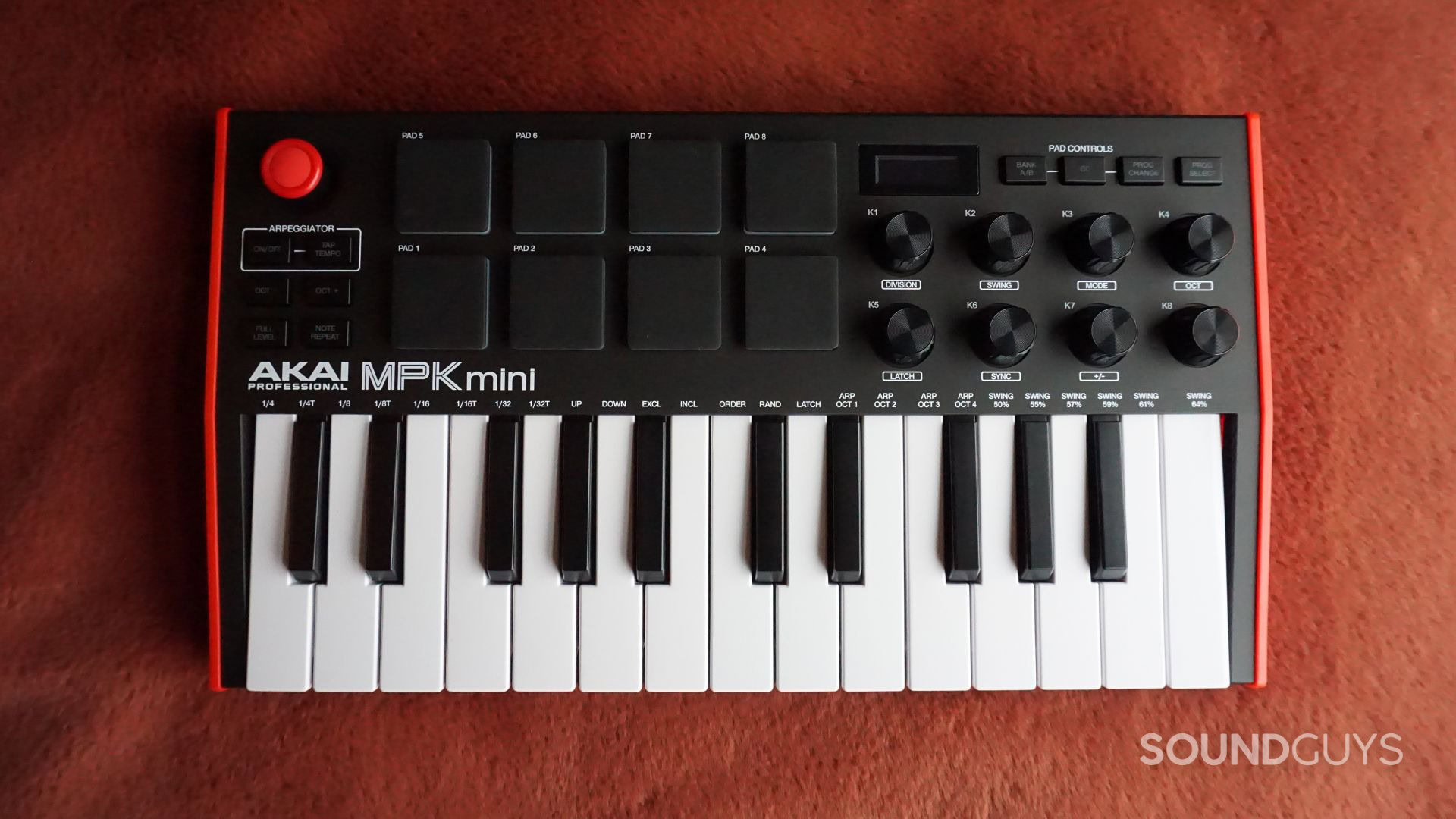
AKAI Professional MPK Mini MK3 review
Published onApril 4, 2025
AKAI Professional MPK Mini MK3
AKAI has been producing consumer electronics since 1946. Originally known for its radio components, the company entered the electronic music industry in 1984. Since then, AKAI has earned a reputation for producing some of the most influential electronic musical equipment on the market. Its eclectic catalog ranges from drum machines to comprehensive standalone music production systems and serves musicians and producers alike. The AKAI Professional MPK Mini MK3 USB-MIDI keyboard is handy for both, offering eight assignable drum pads for beat making and free production software for capturing and editing music. However, with some unconventional quirks and stiff competition, can the MPK Mini MK3 stand tall in an overcrowded market? Find out more in SoundGuys’ AKAI Professional MPK Mini MK3 review.
AKAI Professional MPK Mini MK3 review: At a glance
- What is it? The AKAI Professional MPK Mini MK3 is a 25-key, 8-pad USB-MIDI keyboard and the successor to the MPK Mini MK2.
- What is the price? The AKAI Professional MPK Mini MK3 retails for $119. However, it can often be found on sale for less.
- Where can you buy it? The AKAI Professional MPK Mini MK3 is available from Amazon and most major retailers.
- How did we test it? I tested the AKAI Professional MPK Mini MK3 for 10 days. SoundGuys purchased the review unit.
- Is it worth it? The AKAI Professional MPK Mini MK3 is an excellent all-around USB-MIDI keyboard. The eight assignable velocity-sensitive pads, onboard arpeggiator, and free downloadable music production software elevate the MPK Mini MK3 above its rivals. In particular, the device is handy for beat makers and sampling artists. However, songwriters and those already accustomed to more sophisticated DAWs like Logic, Reaper, and Cubase may find the MPC Beats app unintuitive.
This article was originally published on July 3, 2024. We updated this review on April 4, 2025, to include a comparison to the Akai MPK Mini Plus.
What I like about the AKAI Professional MPK Mini MK3
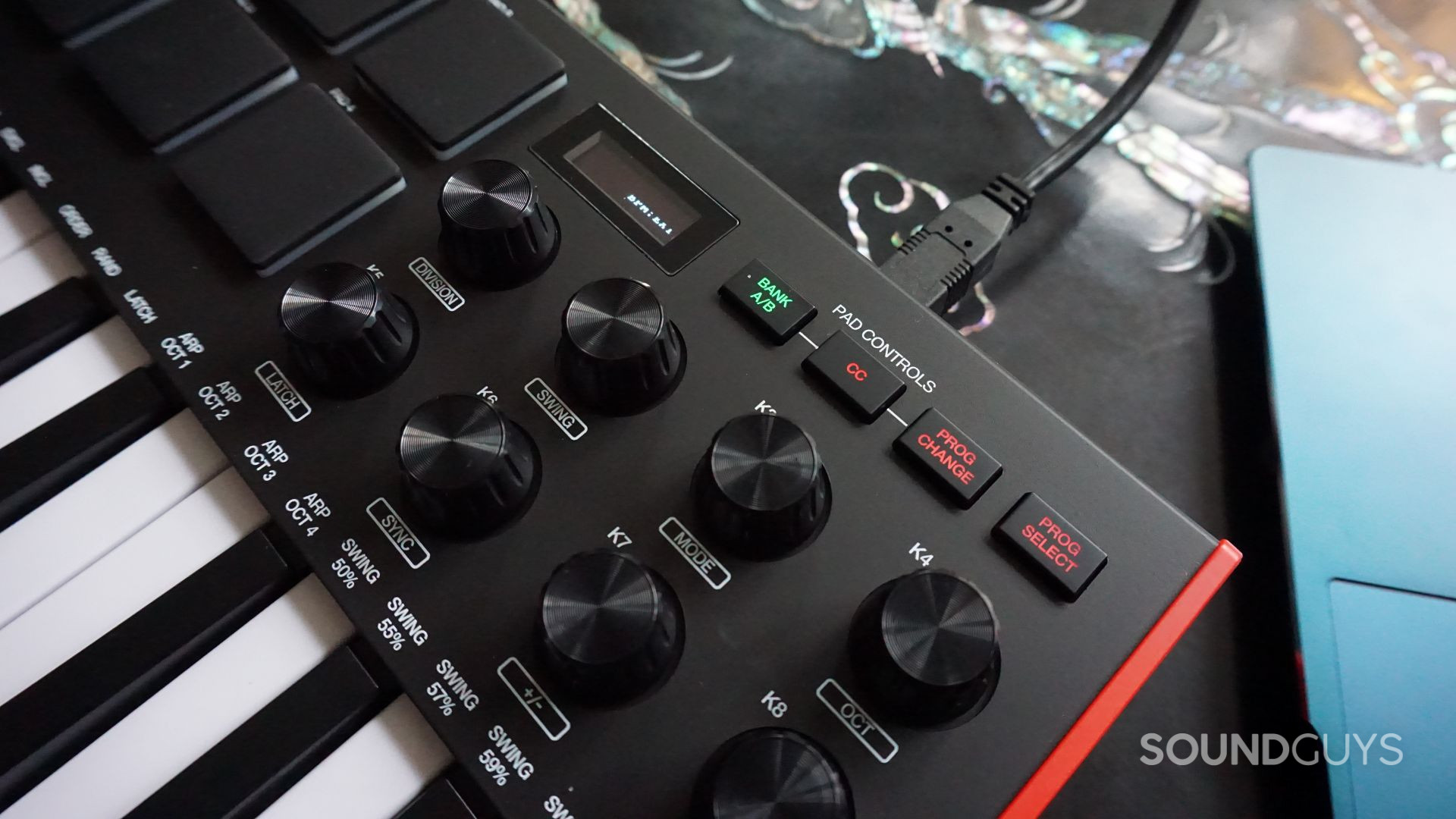
The AKAI MPK Mini MK3 wears a smooth, attractive hard-plastic exterior that feels relatively robust and pleasing. Weighing just 750g and measuring 318 x 181 x 44mm, the MPK Mini MK3 is compact and lightweight enough to fit into most backpacks. The USB-MIDI controller features an updated 25-key keyboard that feels more evenly weighted than its predecessor. When pressed, the keys make a definitive “thump” sound instead of the all-too-common “squeak” of other budget keyboards. AKAI also upgraded the eight onboard knobs, making them taller and more premium to the touch. Unlike the MK2, which needed its sliders readjusting in your DAW to match the location of the knobs on your keyboard, the MK3 owns endless rotary knobs. These are much more convenient, as you can endlessly dial your effects 360 degrees in either direction.
Contrary to most USB-MIDI controllers in this price range, the MK3 features a built-in OLED screen. This makes checking pad velocity, knob parameters, and popular MIDI layouts much easier than the competition. More advanced users can use the MIDI Control Change (CC) button to force the MPK Mini MK3’s pads to send MIDI CC messages instead of MIDI Note On messages. Doing so allows the eight pads to change effects like volume, pan, modulation, or any other midi-controllable parameter in your DAW. This is handy for activating CC-mapped parameters at a specific pad-struck velocity. Enabling the Full Level button returns a maximum MIDI CC value of 127, effectively making the pads a parameter on/off switch when held.
The AKAI Professional MPK Mini MK3 packs 25 keys, eight velocity-sensitive pads, and a built-in arpeggiator in a lightweight and compact form factor.
You can play 16 unique pad effects with the AKAI Professional MPK Mini MK3 by pressing the Bank A/B button to toggle between the first and second pad sets. The keyboard also provides an arsenal of note divisions that can be used with the Note Repeat button to record interesting, quantized drum rhythms. Those wanting to play around with the onboard arpeggiator will find a list of adjustable parameters including tempo, sequences, swing, and octaves. The first can be matched to the speed of your song by pressing the Tap Tempo button in time with the music, and the last benefits from dedicated octave up/down buttons. Bucking industry trends, some may enjoy the X-Y thumbstick. Sliding horizontally bends the keyboard’s pitch, whereas sliding vertically applies a modulation effect. As you move the thumbstick, the OLED screen displays the updated value of the parameter in real time.
Powered by inMusic, AKAI bundles its free music production software MPC Beats with the MPK Mini MK3. Downloading the app begets basic music editing and a list of good-sounding plugins from AIR Music Technology straight out of the box. There are also a host of downloadable sample packs from F9 Audio, ADSR, and more for expanding your media library. Perhaps unsurprisingly, the MPK Mini MK3 works seamlessly with MPC Beats to record music and control software features. However, the software is especially effective for chopping up samples and using the pads to create drum rhythms. Those new to the software can use the introductory videos built into the app to learn its features.
What I don’t like about the AKAI Professional MPK Mini MK3
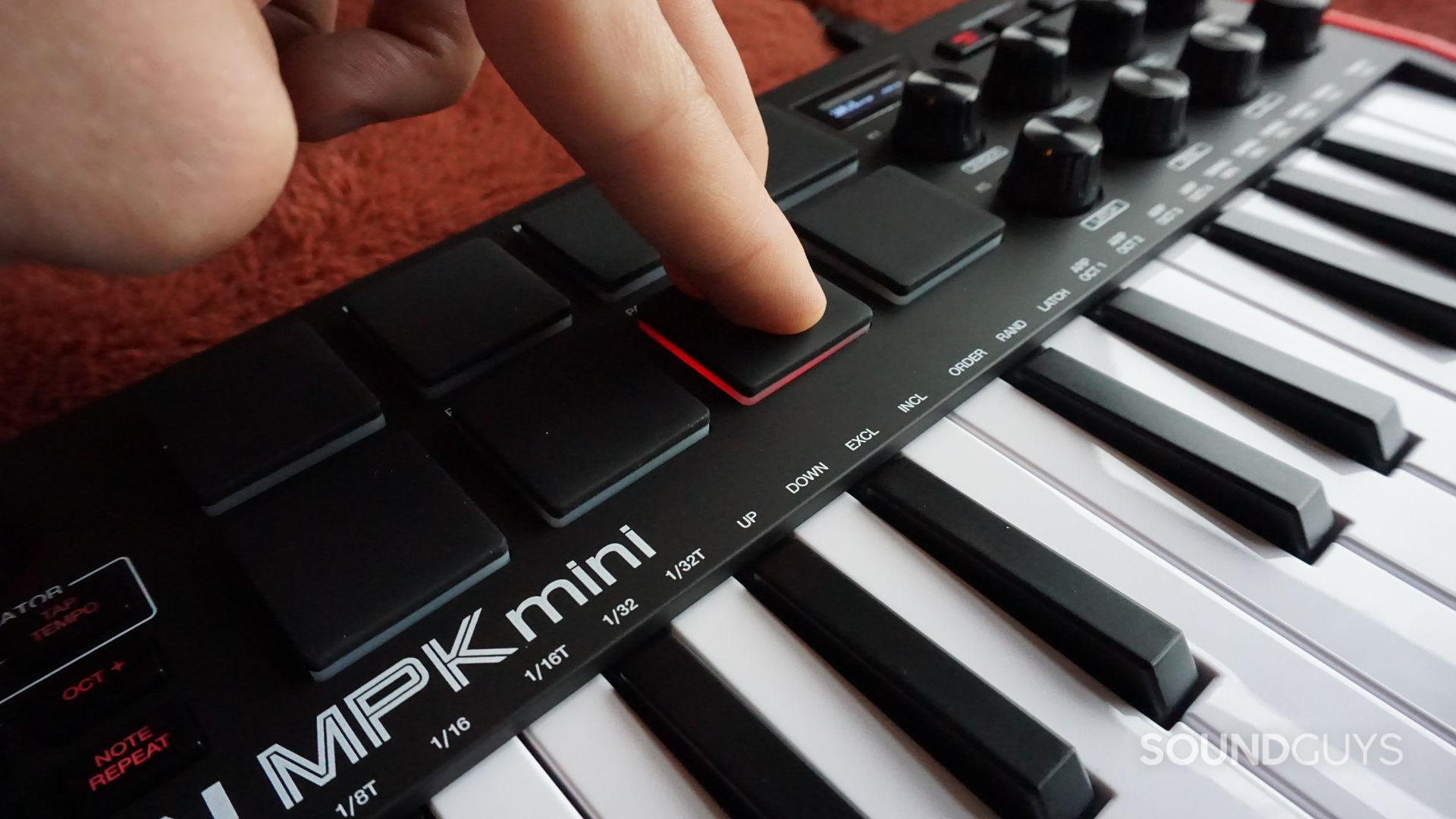
While the AKAI Professional MPK Mini MK3 made some notable improvements upon its predecessor, it is not perfect. Of all its quirks, the most frustrating is that the pads are unforgivably stiff. Whether this results from inconsistent manufacturing quality or a market-wide design flaw remains uncertain. Regardless, it is virtually impossible to finger drum fluidly or register velocity-specific hits consistently. It is also somewhat disappointing that the LEDs under the pads only turn red when hit. Given the pads are velocity-sensitive, it would have been handy if they omitted different colors when struck with differing amounts of force. This would make it easier to finger drum within a specific velocity range. It would also make the keyboard more attractive and enjoyable in darker-lit environments.
The built-in OLED screen separates the MPK Mini MK3 from the competition, but it is a shame that it is low-resolution and monochrome. It also does not relay information directly from your DAW. For example, even though the keyboard’s knobs can control devices while running Ableton, you cannot see the name of the parameter you are adjusting on the OLED screen. This somewhat defeats the point, given it is supposed to work as a seamless extension of your DAW. Similarly, the parameter values linked to the OLED screen show a maximum value of 127, corresponding to full velocity in MIDI language. However, most parameters in popular DAWs have a maximum value of 100. These crossing wires can quickly become confusing, highlighting whether the MPK Mini MK3’s screen has tangible real-world benefits.
The AKAI Professional MPK Mini MK3's thumbstick is less intuitive than touch stripes or pitch wheels.
There are some design-related caveats to the AKAI Professional MPK Mini MK3 retaining a low price tag. For example, its plastic buttons feel much less premium than rubber ones. They also omit a loud and cheap-sounding “click” when pressed which is distracting when creating music without wearing headphones. While the eight endless knobs are an improvement on previous iterations, they feel looser and less heavy than others on the market. The thumbstick is also less intuitive than touch strips or pitch wheels. However, the biggest misstep AKAI made is not including on-board transport controls like Play and Pause. This, and the lack of a MIDI-out port to use the arpeggiator with hardware synthesizers, makes it much less useful for live performance. It also means you must continuously navigate to your DAW or computer to conduct basic track controls.
AKAI’s MPC Beats music production software is handy for beginners. However, those already accustomed to more sophisticated programs may find the user experience unintuitive. In particular, the app is less well-suited for songwriters and those wanting to create elaborate multi-track recordings. While the app hosts instructional videos, AKAI does not include a manual to help you set up the software with the MPK Mini MK3. This is unfortunate given that the layout of MPC Beats is so vastly different from more popular DAWs. It took me several minutes to figure out how to access my plugins and assign them to the tracks I wanted to record.
How does the AKAI Professional MPK Mini MK3 sound?
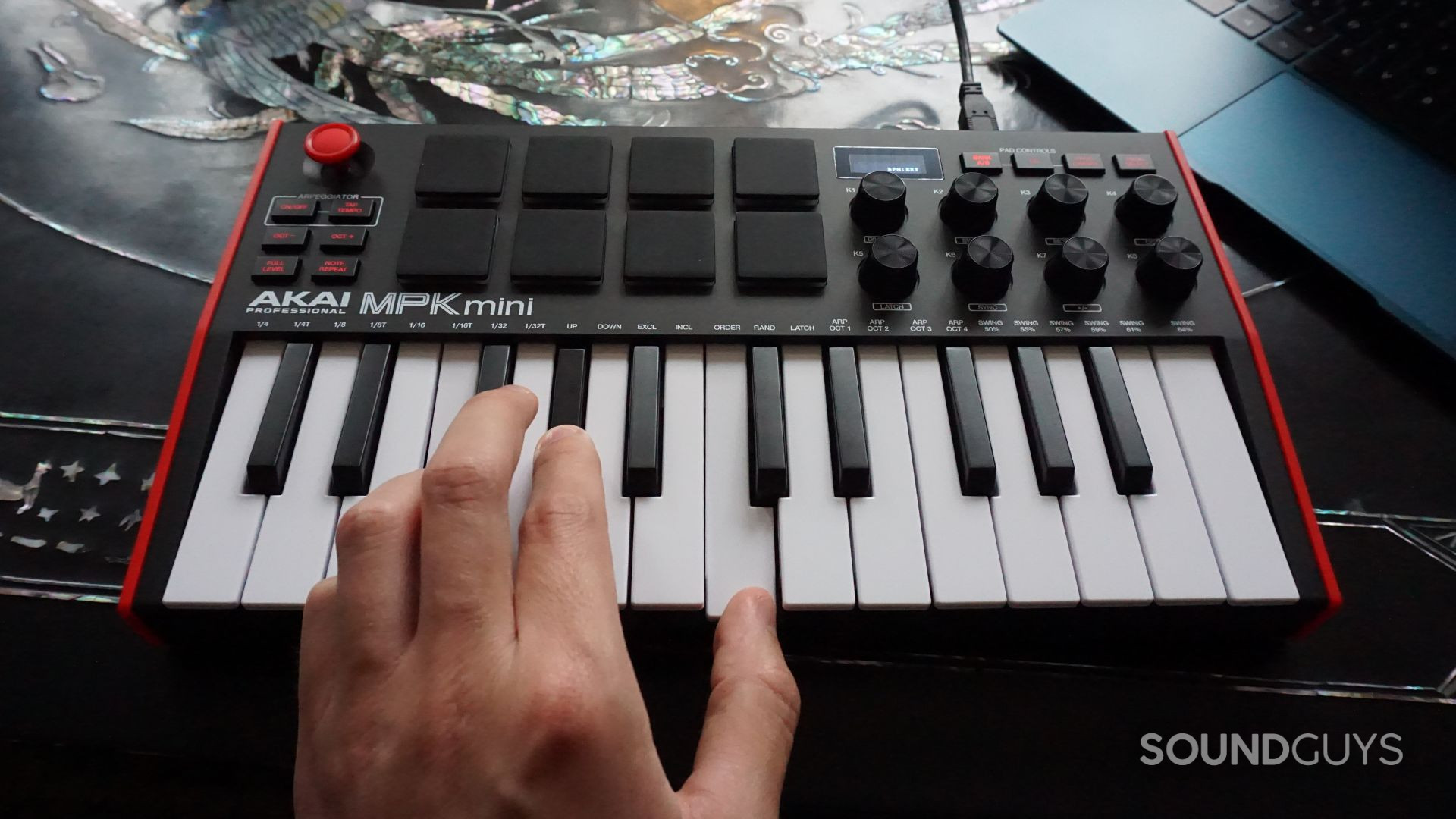
Unlike the AKAI Professional MPK Mini Play MK3 ($99 at Amazon,) the MPK Mini MK3 does not own a built-in audio library or speaker. However, the controller ships with decent-sounding plugins to get you started. Below are three examples of the MPK Mini MK3’s pads and keyboard played with the Pop, RnB, and Trap presets. I recorded each sample directly into MPC Beats with a USB-B to USB-A.
AKAI Professional MPK Mini MK3 Pop sample
AKAI Professional MPK Mini MK3 RnB sample
AKAI Professional MPK Mini MK3 Trap sample
To showcase each sample fairly, I refrained from using the arpeggiator or any pitch or modulation effects.
AKAI Professional MPK Mini MK3 specs
| AKAI Professional MPK Mini MK3 | |
|---|---|
Size | 318 x 181 x 44mm |
Weight | 750g |
Connection | Wired |
Controls | 25 velocity-sensitive keys Eight velocity-sensitive pads X-Y thumbstick Eight 360° knobs Tactile buttons |
Audio inputs | 1/4" TS jack |
Audio outputs | USB-B |
Wireless audio connection | N/A |
Power connector | USB Bus-powered (USB-A to USB-B) |
Price | $119 |
Should you buy the AKAI Professional MPK Mini MK3?
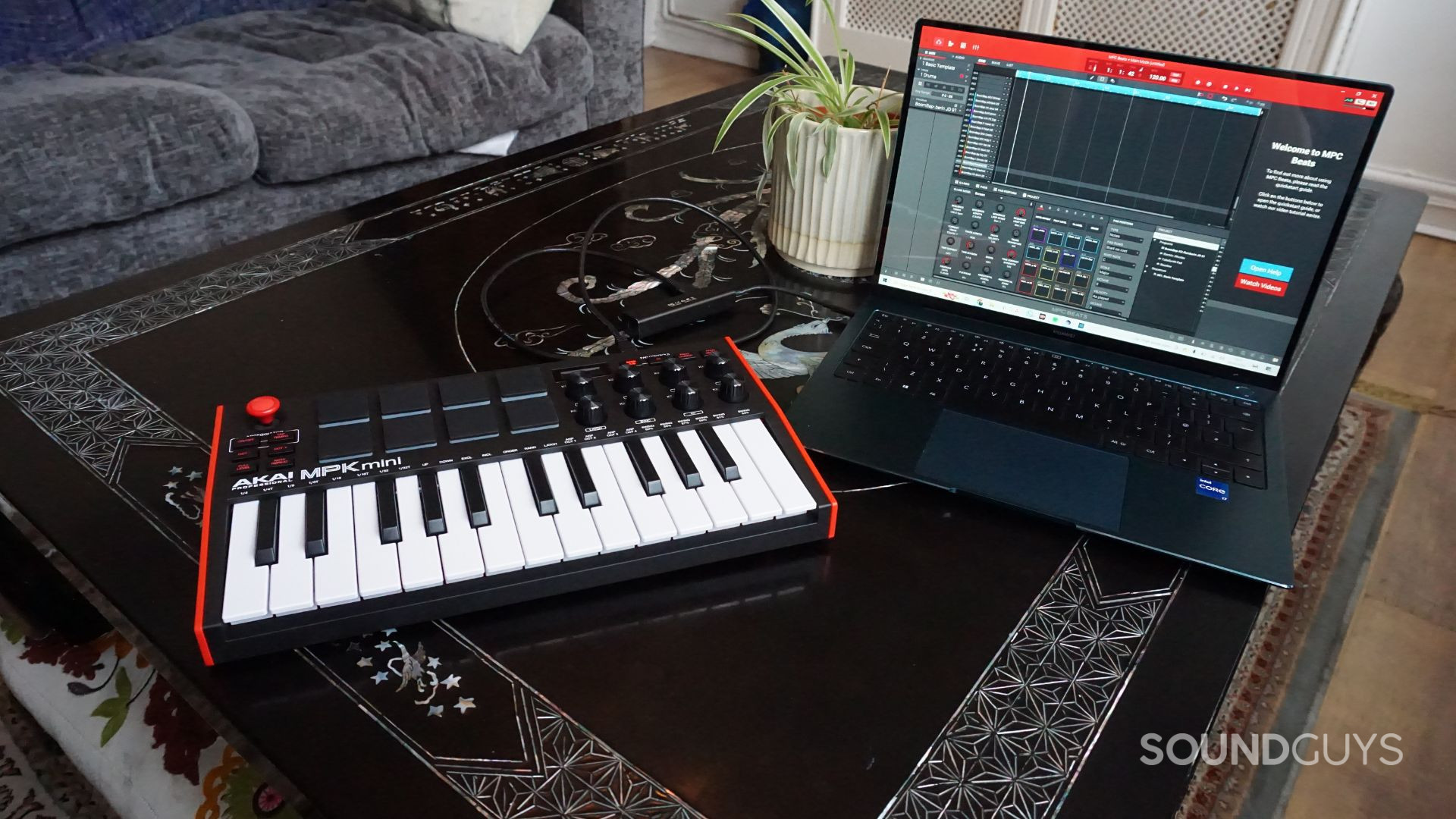
The AKAI Professional MPK Mini MK3 is one of the best all-around budget USB-MIDI keyboards on the market. For ($99 at Amazon,) the MPK Mini MK3 delivers a versatile feature set and a simple plug-and-play user experience. The inclusion of AKAI’s MPC Beats software is excellent for beginners, and the assignable endless knobs make adjusting parameters in your DAW a breeze. However, some similarly priced USB-MIDI keyboards offer even more customization. That raises the question: is the AKAI MPK Mini MK3 worth it?
The Novation Launchkey Mini MK3 ($109.99 at Amazon) features a compact and lightweight build that can be easily transported in a backpack. The controller also owns 25 keys, 16 velocity-sensitive pads, eight rotary knobs, and free plugin bundles. However, unlike the AKAI MPK Mini MK3, the Novation Launchkey Mini MK3 adorns transport controls. These can be used to record, capture MIDI, stop/mute/solo, Clip and Scene launch, volume, pans, and send straight from the keyboard. The Launchkey Mini MK3 also owns an impressive built-in arpeggiator that can auto-generate variations with its Mutate function. Melodic writing is made easier by using the Fixed Chord button to define chord shapes and trigger them up and down the keyboard. Those running external hardware can use the dedicated MIDI-out port to utilize the onboard arpeggiator and chord modes. Unfortunately, the adapter is sold separately.
Those who desire analog and digital sequencing in one place will enjoy the Arturia Keystep Pro ($379.99 at Amazon.) This 37-key controller owns a wide range of inputs and outputs including one MIDI-in, two MIDI-outs, and a USB-B port for two-way MIDI-DAW control. These come equipped with four Control Voltage (CV) voices, each with pitch, velocity/modulation, and gate outputs. On the analog side, the KeyStep Pro features eight drum trigger-outs and clock-in, out, and reset-out ports. There is even a metronome-out with a dedicated level knob and space for inserting a sustain pedal. Inevitably, the Keystep Pro is larger than the AKAI MPK Mini MK3. However, its keyboard is pleasing and features velocity and aftertouch sensitivity. The controller also owns a 16-button sequencer with five rotary parameter knobs for adjusting pitch, gate, velocity, time shift, and randomness. There are also four sequencing channels and an onboard arpeggiator.
The AKAI Professional MPK Mini MK3 is one of the most versatile and compact USB-MIDI controllers in its price range
Staying within the same ecosystem, the Arturia MiniLab 3 ($109 at Amazon) is an excellent and affordable mini workstation. Like the AKAI MPK Mini MK3, it owns eight endless rotary knobs, eight backlit pads with Bank A/B, and an OLED screen. It also benefits from built-in transport controls and touch-based pitch and modulation wheels. Hooking the controller to your DAW provides extra functionality for assigning pads to Clip and Scene functions. You can also use the four built-in sliders for controlling track, send, and pan levels. The keyboard features a dedicated Arturia mode that integrates seamlessly with the company’s Analog Lab plugin. This automatically maps the layout to match the MiniLab 3 and provides parameters for brightness, timbre, effects levels, master EQ, and output level. The keyboard supports USB-C connectivity, a 5-pin MIDI-out port, and a 1/4″ pedal input.
Finally, the Native Instruments Komplete Kontrol M32 ($139 at Amazon) is one of the most satisfying 32-key USB-MIDI controllers on the market. Unlike the Komple Kontrol A25, the M32 ditched the pitch and modulation wheels for touch-based strips. The keyboard also comes equipped with the company’s Komplete Kontrol software which works seamlessly with the controller’s Smart Play feature. This can enable scale snapping, chord triggering, and arpeggiation. The eight capacitive knobs, 4D encoder, and numerous tactile buttons also make controlling built-in parameters a breeze. Sure, the Komplete Kontrol M32 is larger than some of its rivals, given it measures 457 x 167 x 50mm and weighs 1450g. However, its feel is unrivaled and works as a powerhouse wherever you take it.

Akai MPK Mini MK3 vs Akai MPK Mini Plus: Which should you buy?
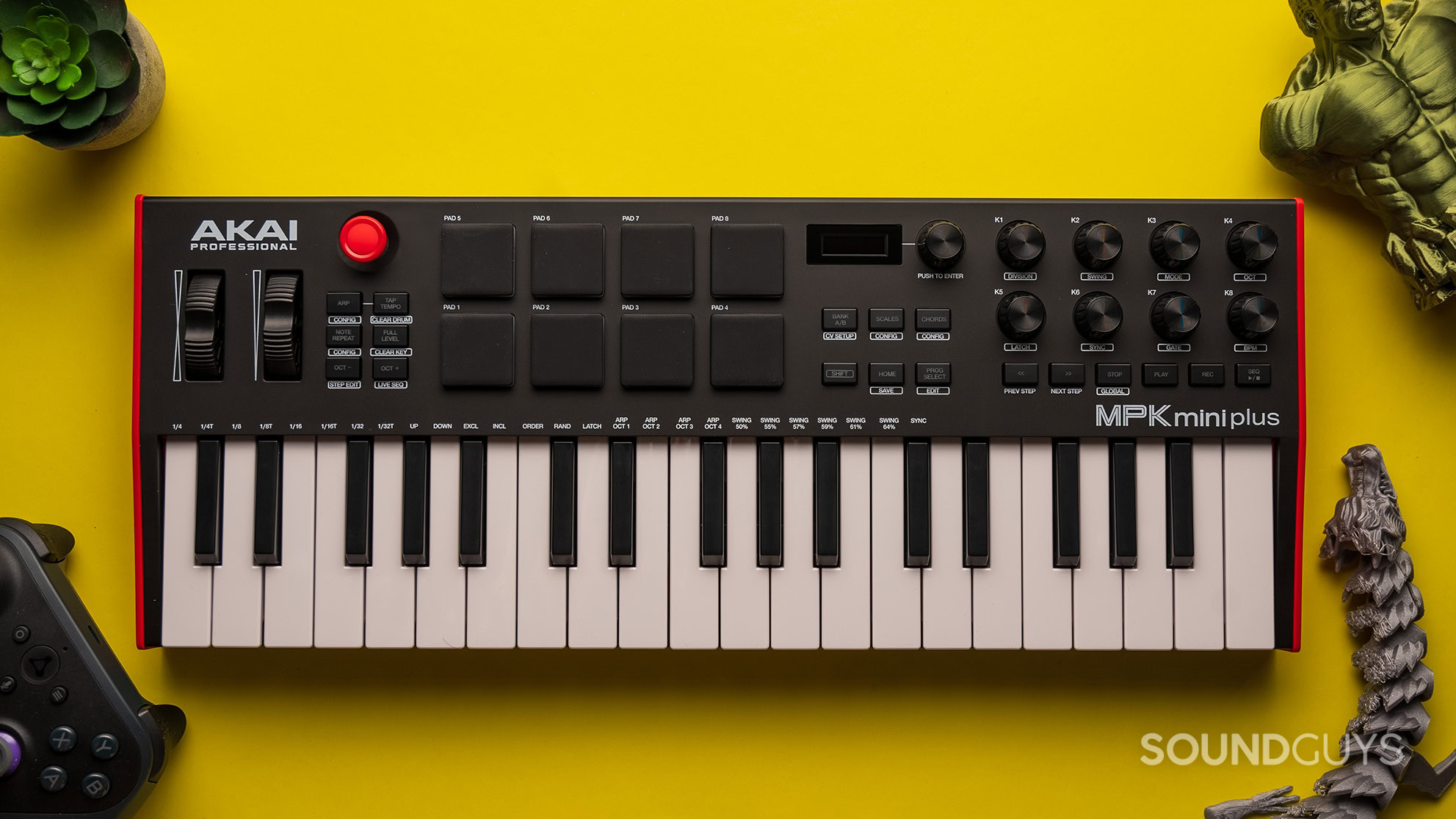
If you want 37 keys instead of 25, and a few more features, you should get the Akai MPK Mini Plus ($169 at Amazon). In addition to the added keys, the MPK Mini Plus has a pitch bend wheel and a modulation wheel. There’s also MIDI and CV/Gate outputs with a built-in sequencer and arpeggiator, which means you can use the keyboard to control analogue gear. If those features don’t sound appealing to you, stick with the smaller and cheaper Akai MPK Mini MK3.
AKAI Professional MPK Mini MK3 review: FAQs
The AKAI MPK Mini MK3 does not ship with Ableton. However, AKAI does provide its MPC Beats software out of the box. This program excels particularly at beat making but is less well-suited for developing sophisticated multi-track recordings.
No, the AKAI MPK Mini MK3 has a mini-sized velocity-sensitive keyboard.
Unfortunately not. However, the AKAI MPK Mini Play MK3 features a built-in speaker and audio library for making music without a computer.
No, the AKAI MPK Mini MK3 does not support Bluetooth.
The MPK Mini MK3 cannot play audio directly from the device itself. However, it does ship with a list of free downloadable plug-ins to use within the MPC Beats music production software.
Yes, the AKAI Professional MPK Mini MK3 works well with GarageBand and any other DAW you throw at it.
The AKAI MPK Mini MK3 works especially well as a DAW controller for GarageBand, Logic, FL Studio, and Ableton. However, it works with any DAW you throw at it including Reaper, Cubase, and Pro Tools.